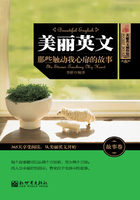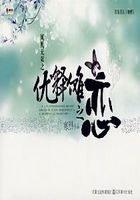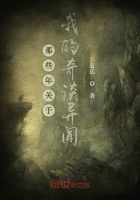A Curious Dream
马克·吐温 / Mark Twain
马克·吐温(Mark Twain,1835—1910),美国幽默大师、小说家、著名演说家,19世纪后期美国现实主义文学的杰出代表。作品风格以幽默与讽刺为主,既富于独特的个人机智与妙语,又不乏深刻的社会洞察与剖析。主要的代表作品有《哈克贝利·费恩历险记》(长篇)、《百万英镑》(短篇)等。
Night before last I had a singular dream. I seemed to be sitting on a doorstep (in no particular city perhaps) ruminating, and the time of night appeared to be about twelve or one o' clock. The weather was balmy and delicious. There was no human sound in the air, not even a footstep. There was no sound of any kind to emphasize the dead stillness, except the occasional hollow barking of a dog in the distance and the fainter answer of a further dog. Presently up the street I heard a bony clack-clacking, and guessed it was the castanets of a serenading party. In a minute more a tall skeleton, hooded, and half clad in a tattered and moldy shroud, whose shreds were flapping about the ribby latticework of its person, swung by me with a stately stride and disappeared in the gray gloom of the starlight. It had a broken and worm-eaten coffin on its shoulder and a bundle of something in its hand. I knew what the clack-clacking was then; it was this party' s joints working together, and his elbows knocking against his sides as he walked. I may say I was surprised. Before I could collect my thoughts and enter upon any speculations as to what this apparition might portend, I heard another one coming for I recognized his clack-clack. He had two-thirds of a coffin on his shoulder, and some foot and head boards under his arm. I mightily wanted, to peer under his hood and speak to him, but when he turned and smiled upon me with his cavernous sockets and his projecting grin as he went by, I thought I would not detain him. He was hardly gone when I heard the clacking again, and another one issued from the shadowy half-light. This one was bending under a heavy gravestone, and dragging a shabby coffin after him by a string. When he got to me he gave me a steady look for a moment or two, and then rounded to and backed up to me, saying:
"Ease this down for a fellow, will you?"
I eased the gravestone down till it rested on the ground, and in doing so noticed that it bore the name of "John Baxter Copmanhurst, " with "May, 1839, " as the date of his death. Deceased sat wearily down by me, and wiped his os frontal with his major maxillary—chiefly from former habit I judged, for I could not see that he brought away any perspiration.
"It is too bad, too bad, " said he, drawing the remnant of the shroud about him and leaning his jaw pensively on his hand. Then he put his left foot up on his knee and fell to scratching his anklebone absently with a rusty nail which he got out of his coffin.
"What is too bad, friend?"
"Oh, everything, everything. I almost wish I never had died."
"You surprise me. Why do you say this? Has anything gone wrong? What is the matter?"
"Matter! Look at this shroud-rags. Look at this gravestone, all battered up. Look at that disgraceful old coffin. All a man' s property going to ruin and destruction before his eyes, and ask him if anything is wrong? Fire and brimstone!"
"Calm yourself, calm yourself, " I said. "It is too bad-it is certainly too bad, but then I had not supposed that you would much mind such matters situated as you are."
"Well, my dear sir, I do mind them. My pride is hurt, and my comfort is impaired—destroyed, I might say. I will state my case—I will put it to you in such a way that you can comprehend it, if you will let me, " said the poor skeleton, tilting the hood of his shroud back, as if he were clearing for action, and thus unconsciously giving himself a jaunty and festive air very much at variance with the grave character of his position in life—so to speak—and in prominent contrast with his distressful mood.
"Proceed, " said I.
"I reside in the shameful old graveyard a block or two above you here, in this street—there, now, I just expected that cartilage would let go!—third rib from the bottom, friend, hitch the end of it to my spine with a string, if you have got such a thing about you, though a bit of silver wire is a deal pleasanter, and more durable and becoming, if one keeps it polished—to think of shredding out and going to pieces in this way, just on account of the indifference and neglect of one' s posterity!" —and the poor ghost grated his teeth in a way that gave me a wrench and a shiver—for the effect is mightily increased by the absence of muffling flesh and cuticle. "I reside in that old graveyard, and have for these thirty years; and I tell you things are changed since I first laid this old tired frame there, and turned over, and stretched out for a long sleep, with a delicious sense upon me of being done with bother, and grief, and anxiety, and doubt, and fear, forever and ever, and listening with comfortable and increasing satisfaction to the sexton' s work, from the startling clatter of his first spadeful on my coffin till it dulled away to the faint patting that shaped the roof of my new home-delicious! My! I wish you could try it tonight!" and out of my reverie deceased fetched me a rattling slap with a bony hand.














